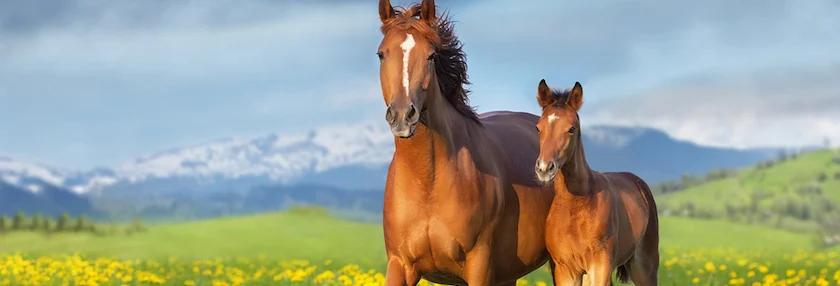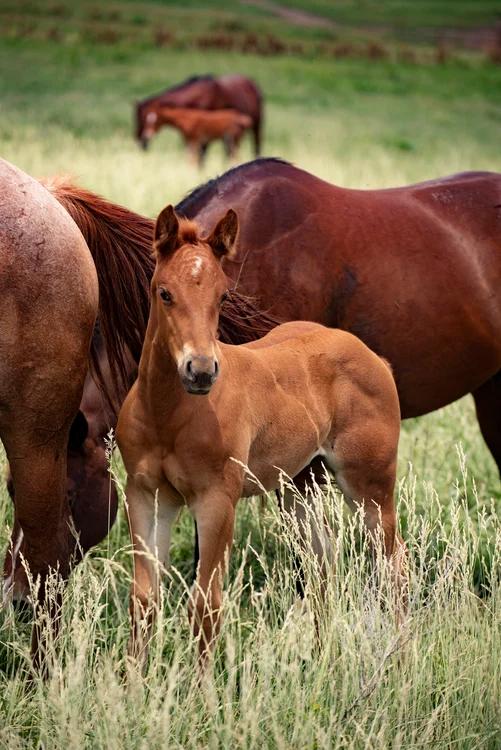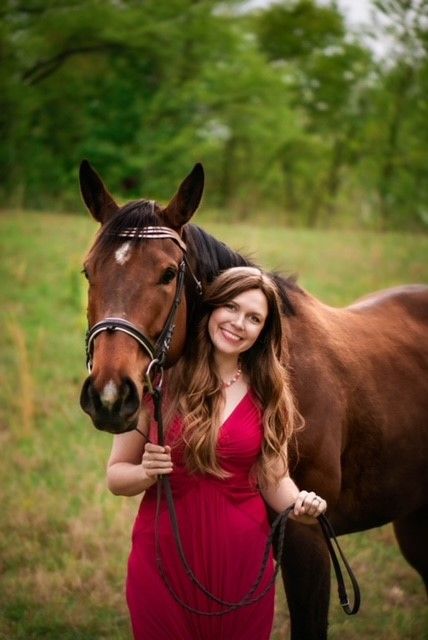Bringing Up Baby


Young horse care essential tips
A horse is a horse, of course, of course, but what needs are different as it relates to the young horse? It’s important to get them off to a good start.
Deworming
For our young horses, Tony Hawkins, DVM, Valley Vet Supply Technical Service Veterinarian, warns that parasites are one of the greatest health concerns. Parasites can diminish a horse’s immunity, rob horses of nutrition, energy and overall wellness. They also can cause critical damage to a horse’s vital organs, hinder performance and impair growth.
“Parasites are a big consideration for the young horse – as early as 6 months old, their parasite risk changes from ascarids to strongyles. Because of this, a fecal egg count (FEC) is recommended around the weanling to yearling time frame,” notes Dr. Hawkins. “For foals, I recommend deworming every two months until a year old.
Foals are prone to ascarids early on, and benzimidazole dewormers (also known as ‘white dewormers’) are recommended. Yearlings and 2-year-olds should be dewormed on average three to four times per year, based on their FEC results, with either ivermectin or moxidectin and praziquantel for tapeworm control in the fall.”
Vaccinations
It’s important that you have proper vaccine protocols in place for your mares, foals and young horses, especially because at their young age, their immunity isn’t built up to protect them, cautions Dr. Hawkins.
“The consideration starts with the mare,” Dr. Hawkins says. “Make sure the mare is properly vaccinated, so the foals receive protection through colostrum.” He continues: “Whatever your mare is at risk for, your foal will be at risk for, as well.”
Dr. Hawkins recommends vaccinating the foal at 4 months of age with the same product you used for your mare. Then, booster with that product at 6 months of age, then again as a yearling.
Dental health
According to the American Association of Equine Practitioners (AAEP), a horse’s age matters in evaluating requirements for dental care. Young horses, such as 2- and 3-year-olds heading into training, will benefit from a comprehensive dental exam.
“Teeth should be floated to remove any sharp points and checked for retained caps. Caps should be removed if they have not been shed. This should be done before training begins to prevent training problems related to sharp teeth,” states the AAEP.
Young horses, between 2- and 5-years-old, may require more attentive dental care.
“Deciduous teeth tend to be softer than permanent teeth and may develop sharp enamel points more quickly. Also, there is an extraordinary amount of dental maturation during this period. Twenty-four teeth will be shed and replaced by 36 to 40 adult teeth,” the AAEP states.
Read more at the AAEP’s article, “The Importance of Maintaining the Health of Your Horse's Mouth.”

General nutrition
“Once the foal is on the ground and weaned, don’t just kick them out to pasture,” warns Jyme Nichols, PhD, Stride Animal Health Director of Nutrition. “The first 2 to 3 years is a critical phase where extra high levels of trace minerals and amino acids are needed to support proper bone and joint health.”
Plan on feeding a fortified feed with essential, single amino acid-bound trace minerals including copper, zinc and manganese. These will encourage maximum structural integrity.
“It does not matter how much glucosamine, MSM, chondroitin or hyaluronic acid you pump into a horse, if those basic trace minerals and amino acids are lacking, they will never reach full structural potential,” Dr. Nichols says.
For the young horse, it’s best to prioritize “Forage first. If green grass is an option, I’m a fan,” observes Dr. Nichols. “Just keep in mind that grass, hay or alfalfa do not provide adequate trace mineral levels for a young horse. You must provide those critical nutrients through a fortified feed or a supplement.”
She recommends working with an equine nutritionist to ensure levels of lysine, methionine, zinc, copper, manganese, and selenium are included in the diet in proper levels and ratios.
Learn more at ValleyVet.com.
About the author
A co-recipient of the 2022 AHP Equine Media NextGen Award, Aimee Elyse Robinson, draws from her lifelong experience with horses. She and her husband live on an Oklahoma ranchette that’s also home to off-track Thoroughbreds, and rescue and foster dogs.
Horse rookie? Learn more about foals here https://horserookie.com/how-to-care-for-a-yearling-horse/
View a helpful tutorial on new foal care
Tags:Horse Sense

Acreage Life is part of the Catalyst Communications Network publication family.
















